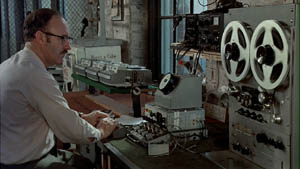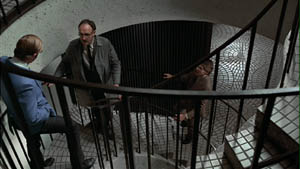|
Between The Godfather parts one and two, Francis Ford Coppola created this extremely well-plotted and personal thriller about the extremely impersonal niche profession of surveillance. Considering the success which met his prior and subsequent films, it's somewhat surprising that this one isn't more well-known than it is.  The Conversation follows the life of Harry Caul, played by the versatile and always top-notch Gene Hackman, who is assigned to follow and record the communications between two young people for reasons he isn't told, but begins to suspect. While trying to keep his professional detachment, he nevertheless can't forget the tragic consequences that were sparked by a previous assignment, and against his own advice begins to take a personal interest in the conversation he's recorded, worried that it might provoke a violent retribution from his client. The film is rather reminiscent of Rear Window in that it follows the story from the point of view of the observer, who attempts to piece together the facts from fragments of out-of-context information his spying has gleaned. But aside from the tension, The Conversation is almost Rear Window's emotional opposite. Where Jimmy Stewart played a man who was sociable and had lots of friends (not to mention being wined and dined by Grace Kelly,) Hackman's Caul is an unromantic, unsociable misfit who, perhaps in direct response to his profession, is manically obsessed with his own privacy. Unwilling to open up to his girlfriend, his co-workers, or even the priest at his confessional, Harry clearly wants to be wanted and accepted. He dreams of divulging random personal facts to those on the periphery of his world, but in his waking hours he will brook no incursions upon his private life. In the end, it's up to Caul alone to try and solve the mystery, even as he grapples with whether or not he really wants to.  A low-key psychological thriller that doesn't rely upon explosions, gunfights, or even terribly large-scale conspiracies, The Conversation is more about subjectivity than is immediately apparent. In this sense, it parallels its protagonist's attitudes; Harry maintains throughout and constantly tells himself (via the method of telling everyone else) that he doesn't care about the content of the recordings he makes. It's just a job, no personal interest, total objectivity, or so he claims, when his own baggage is motivating him more than he'd like to believe. The Conversation is about our worries and hangups, and how our predispositions affect our beliefs and our behavior. And above all, it's about the nature of privacy, both that of others and our own, and the potentially disastrous consequences of communication breakdowns. They'll drive you insane. As an odd bit of film trivia, the movie Enemy of the State all but resurrected the character of Harry Caul under a different name. Hackman plays an aging, retired wiretapper with an uncomfortable past who dresses the same and even works out of the same lab as his previous incarnation. In all other respects, though, the film is pretty much the antithesis of The Conversation, in that it involves a huge conspiracy, gunfights and explosions. For myself, I'll take the quieter film that actually says something. -review by Matt Murray
|
|
||||||||